Reflective Essay on Health and Social Care: Unit 4 Assignment
VerifiedAdded on 2021/06/16
|8
|1933
|37
Essay
AI Summary
This reflective essay examines the professional practice of a health and social care worker, detailing strengths such as respect, dignity, punctuality, and communication skills. It addresses weaknesses like non-verbal communication and time management, and the impact of cultural and religious values on patient care. The essay explores the importance of teamwork, including team roles, team development stages, and the impact of leadership styles. It references key concepts such as Belbin's team roles and Tuckman's stages of team development, highlighting the need for effective communication, commitment, and open attitudes within a team to achieve common goals. The author emphasizes the significance of fostering a caring culture in health and social care to ensure the well-being of service users.
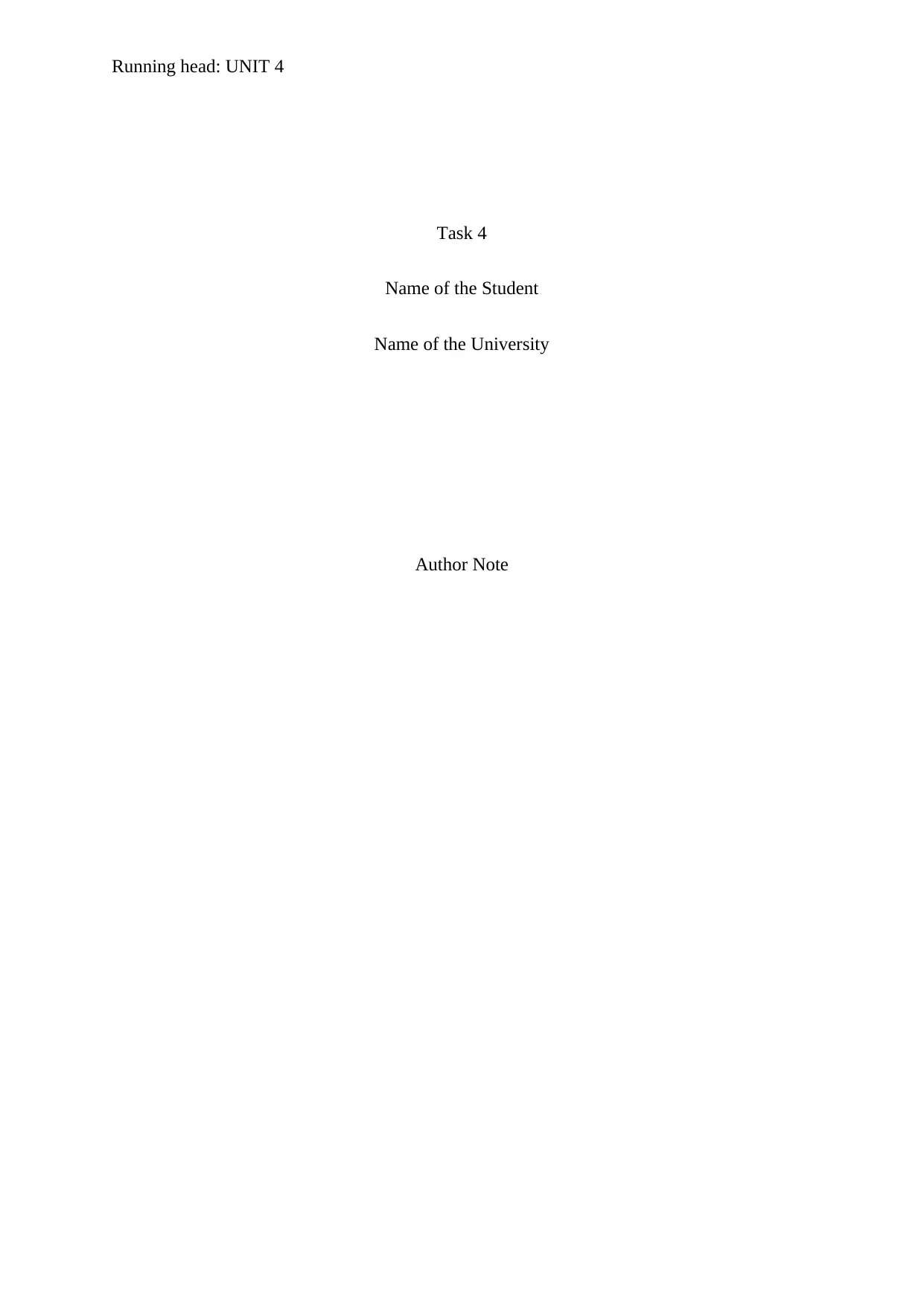
Running head: UNIT 4
Task 4
Name of the Student
Name of the University
Author Note
Task 4
Name of the Student
Name of the University
Author Note
Paraphrase This Document
Need a fresh take? Get an instant paraphrase of this document with our AI Paraphraser
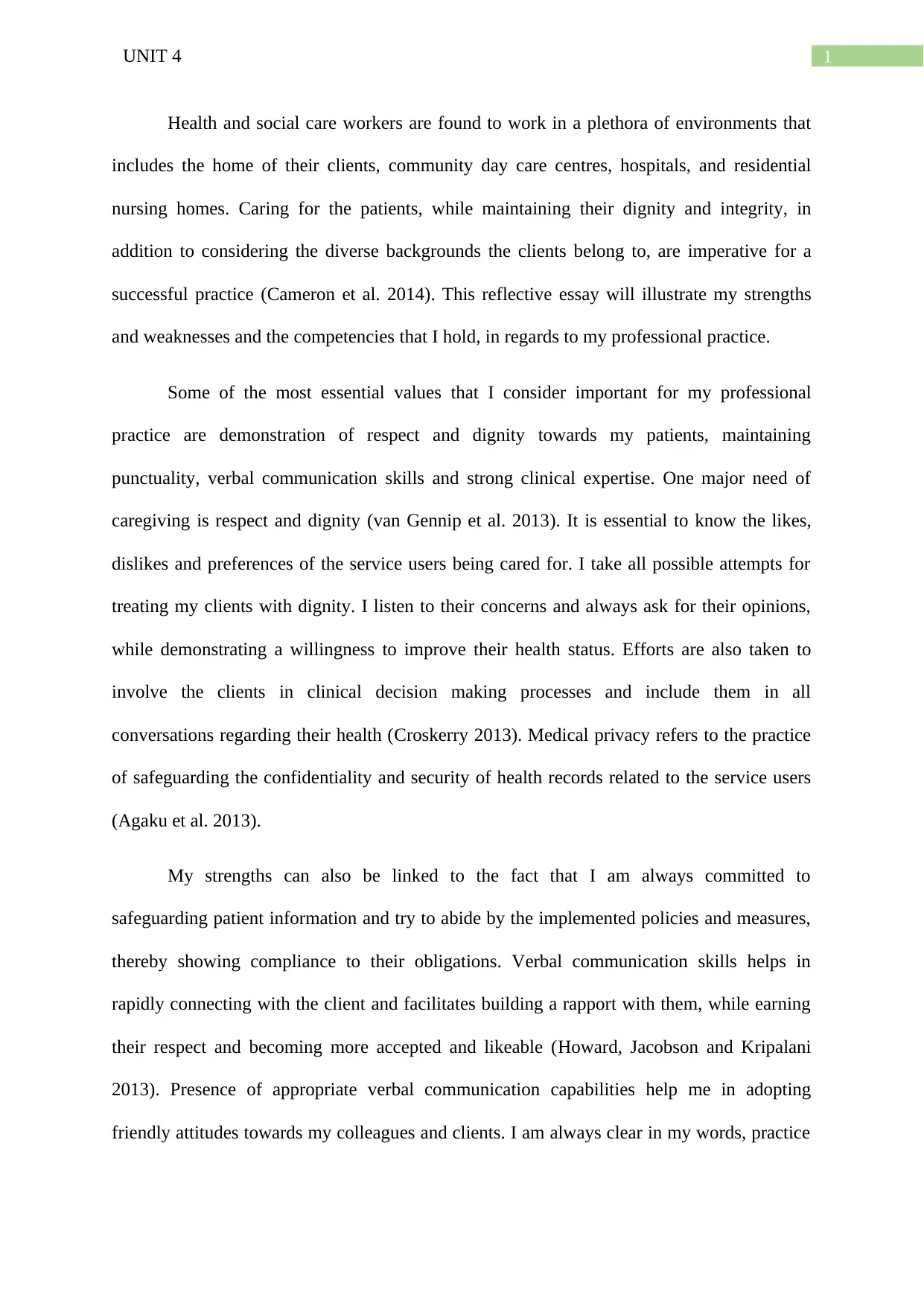
1UNIT 4
Health and social care workers are found to work in a plethora of environments that
includes the home of their clients, community day care centres, hospitals, and residential
nursing homes. Caring for the patients, while maintaining their dignity and integrity, in
addition to considering the diverse backgrounds the clients belong to, are imperative for a
successful practice (Cameron et al. 2014). This reflective essay will illustrate my strengths
and weaknesses and the competencies that I hold, in regards to my professional practice.
Some of the most essential values that I consider important for my professional
practice are demonstration of respect and dignity towards my patients, maintaining
punctuality, verbal communication skills and strong clinical expertise. One major need of
caregiving is respect and dignity (van Gennip et al. 2013). It is essential to know the likes,
dislikes and preferences of the service users being cared for. I take all possible attempts for
treating my clients with dignity. I listen to their concerns and always ask for their opinions,
while demonstrating a willingness to improve their health status. Efforts are also taken to
involve the clients in clinical decision making processes and include them in all
conversations regarding their health (Croskerry 2013). Medical privacy refers to the practice
of safeguarding the confidentiality and security of health records related to the service users
(Agaku et al. 2013).
My strengths can also be linked to the fact that I am always committed to
safeguarding patient information and try to abide by the implemented policies and measures,
thereby showing compliance to their obligations. Verbal communication skills helps in
rapidly connecting with the client and facilitates building a rapport with them, while earning
their respect and becoming more accepted and likeable (Howard, Jacobson and Kripalani
2013). Presence of appropriate verbal communication capabilities help me in adopting
friendly attitudes towards my colleagues and clients. I am always clear in my words, practice
Health and social care workers are found to work in a plethora of environments that
includes the home of their clients, community day care centres, hospitals, and residential
nursing homes. Caring for the patients, while maintaining their dignity and integrity, in
addition to considering the diverse backgrounds the clients belong to, are imperative for a
successful practice (Cameron et al. 2014). This reflective essay will illustrate my strengths
and weaknesses and the competencies that I hold, in regards to my professional practice.
Some of the most essential values that I consider important for my professional
practice are demonstration of respect and dignity towards my patients, maintaining
punctuality, verbal communication skills and strong clinical expertise. One major need of
caregiving is respect and dignity (van Gennip et al. 2013). It is essential to know the likes,
dislikes and preferences of the service users being cared for. I take all possible attempts for
treating my clients with dignity. I listen to their concerns and always ask for their opinions,
while demonstrating a willingness to improve their health status. Efforts are also taken to
involve the clients in clinical decision making processes and include them in all
conversations regarding their health (Croskerry 2013). Medical privacy refers to the practice
of safeguarding the confidentiality and security of health records related to the service users
(Agaku et al. 2013).
My strengths can also be linked to the fact that I am always committed to
safeguarding patient information and try to abide by the implemented policies and measures,
thereby showing compliance to their obligations. Verbal communication skills helps in
rapidly connecting with the client and facilitates building a rapport with them, while earning
their respect and becoming more accepted and likeable (Howard, Jacobson and Kripalani
2013). Presence of appropriate verbal communication capabilities help me in adopting
friendly attitudes towards my colleagues and clients. I am always clear in my words, practice
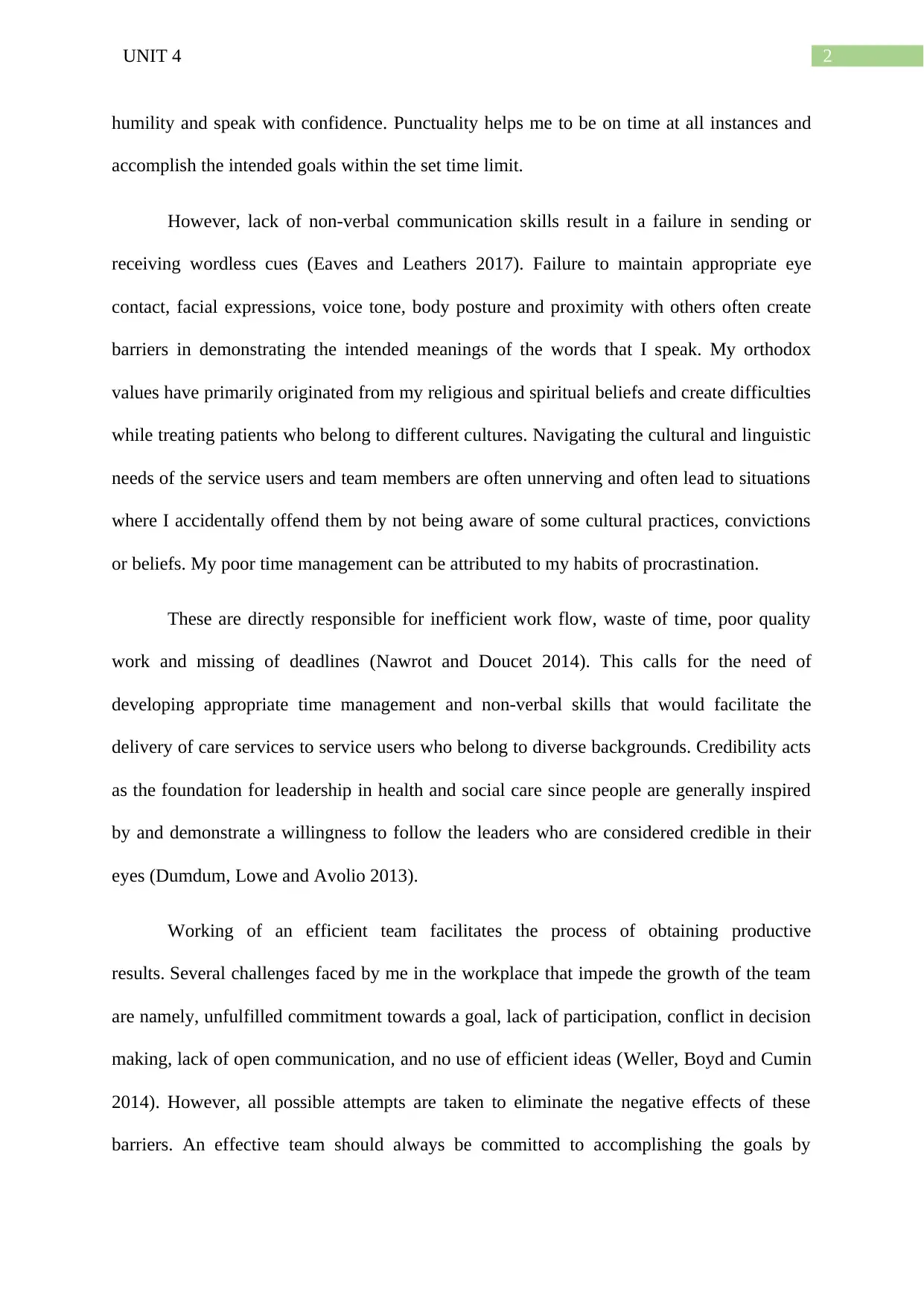
2UNIT 4
humility and speak with confidence. Punctuality helps me to be on time at all instances and
accomplish the intended goals within the set time limit.
However, lack of non-verbal communication skills result in a failure in sending or
receiving wordless cues (Eaves and Leathers 2017). Failure to maintain appropriate eye
contact, facial expressions, voice tone, body posture and proximity with others often create
barriers in demonstrating the intended meanings of the words that I speak. My orthodox
values have primarily originated from my religious and spiritual beliefs and create difficulties
while treating patients who belong to different cultures. Navigating the cultural and linguistic
needs of the service users and team members are often unnerving and often lead to situations
where I accidentally offend them by not being aware of some cultural practices, convictions
or beliefs. My poor time management can be attributed to my habits of procrastination.
These are directly responsible for inefficient work flow, waste of time, poor quality
work and missing of deadlines (Nawrot and Doucet 2014). This calls for the need of
developing appropriate time management and non-verbal skills that would facilitate the
delivery of care services to service users who belong to diverse backgrounds. Credibility acts
as the foundation for leadership in health and social care since people are generally inspired
by and demonstrate a willingness to follow the leaders who are considered credible in their
eyes (Dumdum, Lowe and Avolio 2013).
Working of an efficient team facilitates the process of obtaining productive
results. Several challenges faced by me in the workplace that impede the growth of the team
are namely, unfulfilled commitment towards a goal, lack of participation, conflict in decision
making, lack of open communication, and no use of efficient ideas (Weller, Boyd and Cumin
2014). However, all possible attempts are taken to eliminate the negative effects of these
barriers. An effective team should always be committed to accomplishing the goals by
humility and speak with confidence. Punctuality helps me to be on time at all instances and
accomplish the intended goals within the set time limit.
However, lack of non-verbal communication skills result in a failure in sending or
receiving wordless cues (Eaves and Leathers 2017). Failure to maintain appropriate eye
contact, facial expressions, voice tone, body posture and proximity with others often create
barriers in demonstrating the intended meanings of the words that I speak. My orthodox
values have primarily originated from my religious and spiritual beliefs and create difficulties
while treating patients who belong to different cultures. Navigating the cultural and linguistic
needs of the service users and team members are often unnerving and often lead to situations
where I accidentally offend them by not being aware of some cultural practices, convictions
or beliefs. My poor time management can be attributed to my habits of procrastination.
These are directly responsible for inefficient work flow, waste of time, poor quality
work and missing of deadlines (Nawrot and Doucet 2014). This calls for the need of
developing appropriate time management and non-verbal skills that would facilitate the
delivery of care services to service users who belong to diverse backgrounds. Credibility acts
as the foundation for leadership in health and social care since people are generally inspired
by and demonstrate a willingness to follow the leaders who are considered credible in their
eyes (Dumdum, Lowe and Avolio 2013).
Working of an efficient team facilitates the process of obtaining productive
results. Several challenges faced by me in the workplace that impede the growth of the team
are namely, unfulfilled commitment towards a goal, lack of participation, conflict in decision
making, lack of open communication, and no use of efficient ideas (Weller, Boyd and Cumin
2014). However, all possible attempts are taken to eliminate the negative effects of these
barriers. An effective team should always be committed to accomplishing the goals by
⊘ This is a preview!⊘
Do you want full access?
Subscribe today to unlock all pages.

Trusted by 1+ million students worldwide
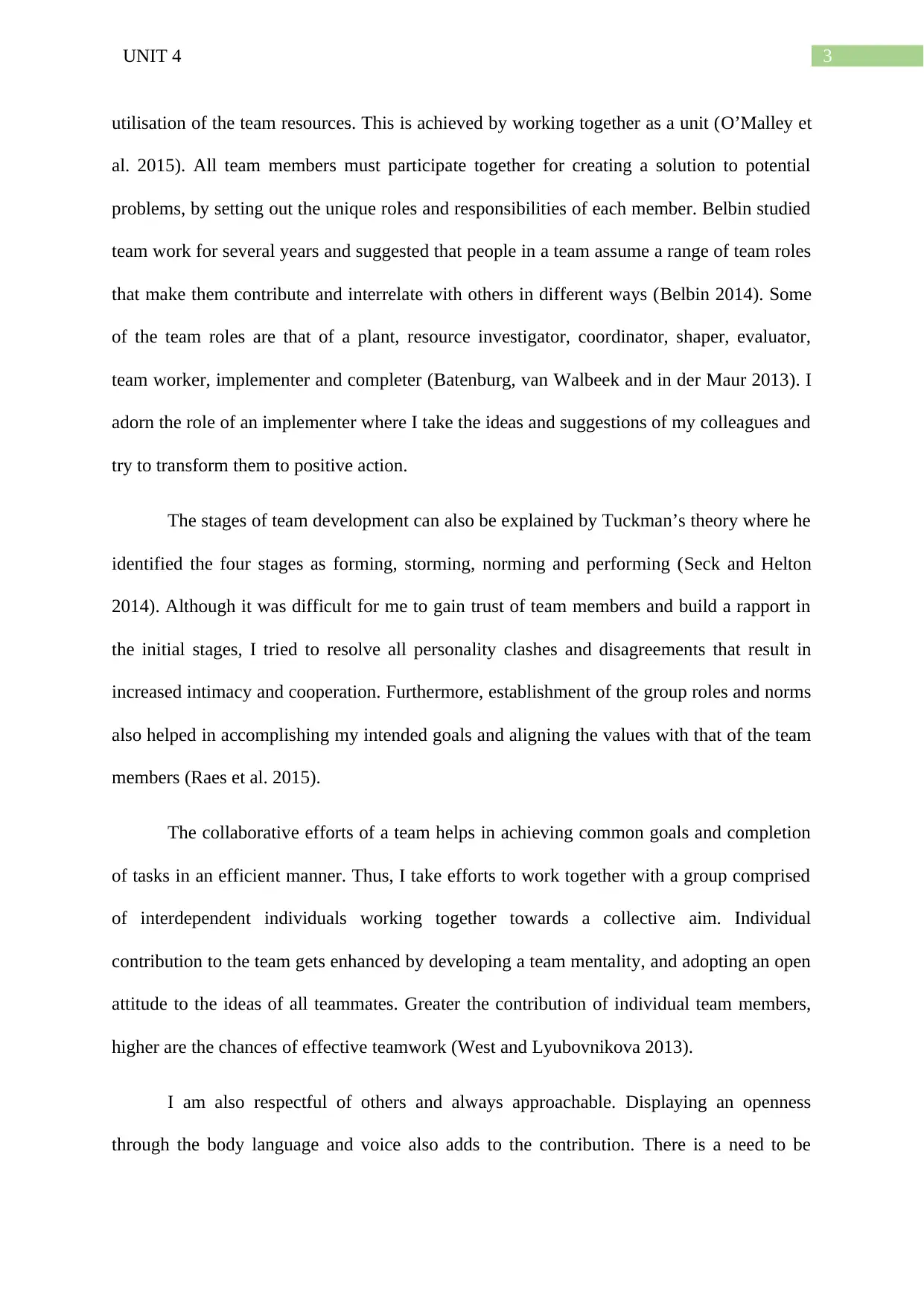
3UNIT 4
utilisation of the team resources. This is achieved by working together as a unit (O’Malley et
al. 2015). All team members must participate together for creating a solution to potential
problems, by setting out the unique roles and responsibilities of each member. Belbin studied
team work for several years and suggested that people in a team assume a range of team roles
that make them contribute and interrelate with others in different ways (Belbin 2014). Some
of the team roles are that of a plant, resource investigator, coordinator, shaper, evaluator,
team worker, implementer and completer (Batenburg, van Walbeek and in der Maur 2013). I
adorn the role of an implementer where I take the ideas and suggestions of my colleagues and
try to transform them to positive action.
The stages of team development can also be explained by Tuckman’s theory where he
identified the four stages as forming, storming, norming and performing (Seck and Helton
2014). Although it was difficult for me to gain trust of team members and build a rapport in
the initial stages, I tried to resolve all personality clashes and disagreements that result in
increased intimacy and cooperation. Furthermore, establishment of the group roles and norms
also helped in accomplishing my intended goals and aligning the values with that of the team
members (Raes et al. 2015).
The collaborative efforts of a team helps in achieving common goals and completion
of tasks in an efficient manner. Thus, I take efforts to work together with a group comprised
of interdependent individuals working together towards a collective aim. Individual
contribution to the team gets enhanced by developing a team mentality, and adopting an open
attitude to the ideas of all teammates. Greater the contribution of individual team members,
higher are the chances of effective teamwork (West and Lyubovnikova 2013).
I am also respectful of others and always approachable. Displaying an openness
through the body language and voice also adds to the contribution. There is a need to be
utilisation of the team resources. This is achieved by working together as a unit (O’Malley et
al. 2015). All team members must participate together for creating a solution to potential
problems, by setting out the unique roles and responsibilities of each member. Belbin studied
team work for several years and suggested that people in a team assume a range of team roles
that make them contribute and interrelate with others in different ways (Belbin 2014). Some
of the team roles are that of a plant, resource investigator, coordinator, shaper, evaluator,
team worker, implementer and completer (Batenburg, van Walbeek and in der Maur 2013). I
adorn the role of an implementer where I take the ideas and suggestions of my colleagues and
try to transform them to positive action.
The stages of team development can also be explained by Tuckman’s theory where he
identified the four stages as forming, storming, norming and performing (Seck and Helton
2014). Although it was difficult for me to gain trust of team members and build a rapport in
the initial stages, I tried to resolve all personality clashes and disagreements that result in
increased intimacy and cooperation. Furthermore, establishment of the group roles and norms
also helped in accomplishing my intended goals and aligning the values with that of the team
members (Raes et al. 2015).
The collaborative efforts of a team helps in achieving common goals and completion
of tasks in an efficient manner. Thus, I take efforts to work together with a group comprised
of interdependent individuals working together towards a collective aim. Individual
contribution to the team gets enhanced by developing a team mentality, and adopting an open
attitude to the ideas of all teammates. Greater the contribution of individual team members,
higher are the chances of effective teamwork (West and Lyubovnikova 2013).
I am also respectful of others and always approachable. Displaying an openness
through the body language and voice also adds to the contribution. There is a need to be
Paraphrase This Document
Need a fresh take? Get an instant paraphrase of this document with our AI Paraphraser
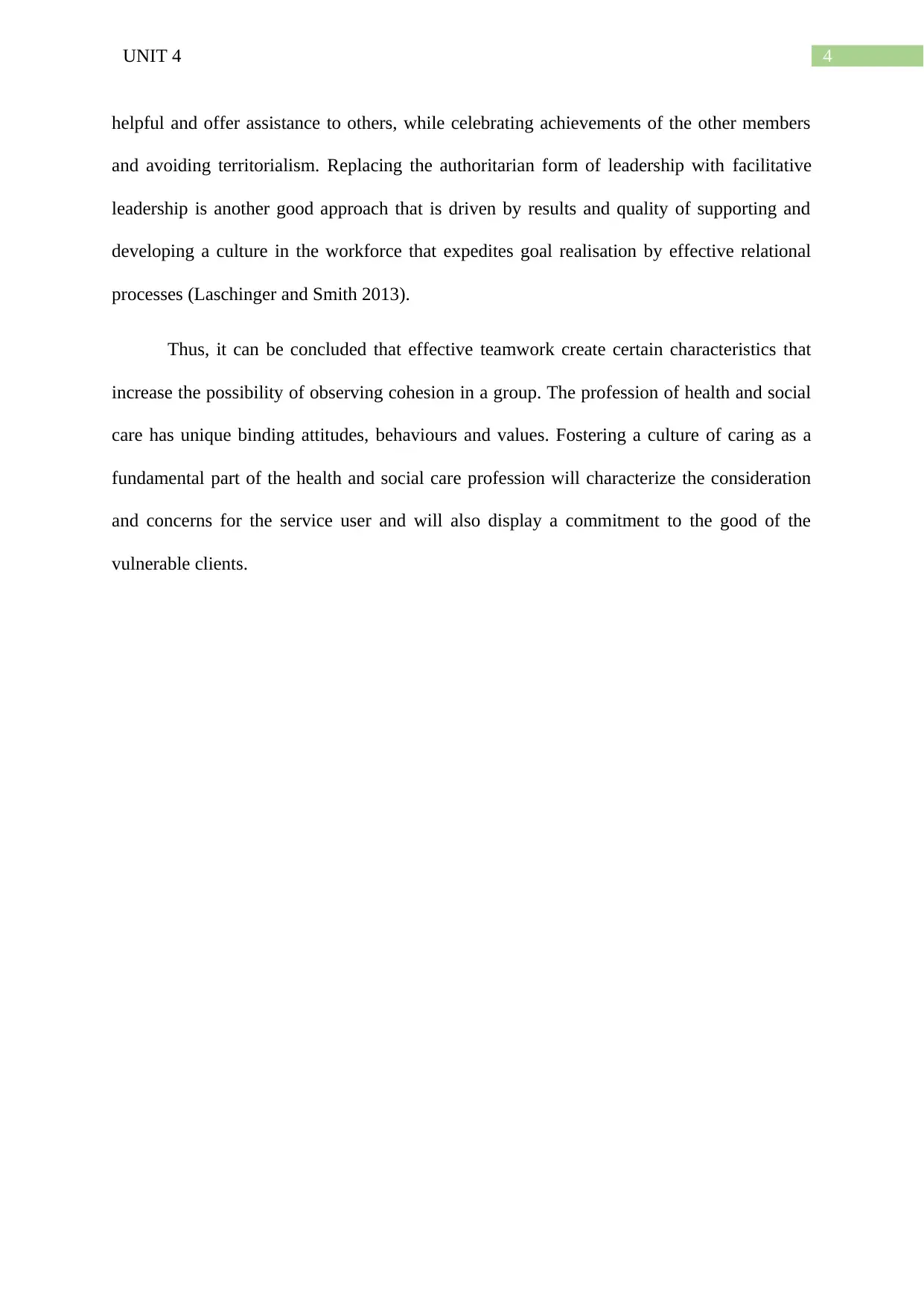
4UNIT 4
helpful and offer assistance to others, while celebrating achievements of the other members
and avoiding territorialism. Replacing the authoritarian form of leadership with facilitative
leadership is another good approach that is driven by results and quality of supporting and
developing a culture in the workforce that expedites goal realisation by effective relational
processes (Laschinger and Smith 2013).
Thus, it can be concluded that effective teamwork create certain characteristics that
increase the possibility of observing cohesion in a group. The profession of health and social
care has unique binding attitudes, behaviours and values. Fostering a culture of caring as a
fundamental part of the health and social care profession will characterize the consideration
and concerns for the service user and will also display a commitment to the good of the
vulnerable clients.
helpful and offer assistance to others, while celebrating achievements of the other members
and avoiding territorialism. Replacing the authoritarian form of leadership with facilitative
leadership is another good approach that is driven by results and quality of supporting and
developing a culture in the workforce that expedites goal realisation by effective relational
processes (Laschinger and Smith 2013).
Thus, it can be concluded that effective teamwork create certain characteristics that
increase the possibility of observing cohesion in a group. The profession of health and social
care has unique binding attitudes, behaviours and values. Fostering a culture of caring as a
fundamental part of the health and social care profession will characterize the consideration
and concerns for the service user and will also display a commitment to the good of the
vulnerable clients.
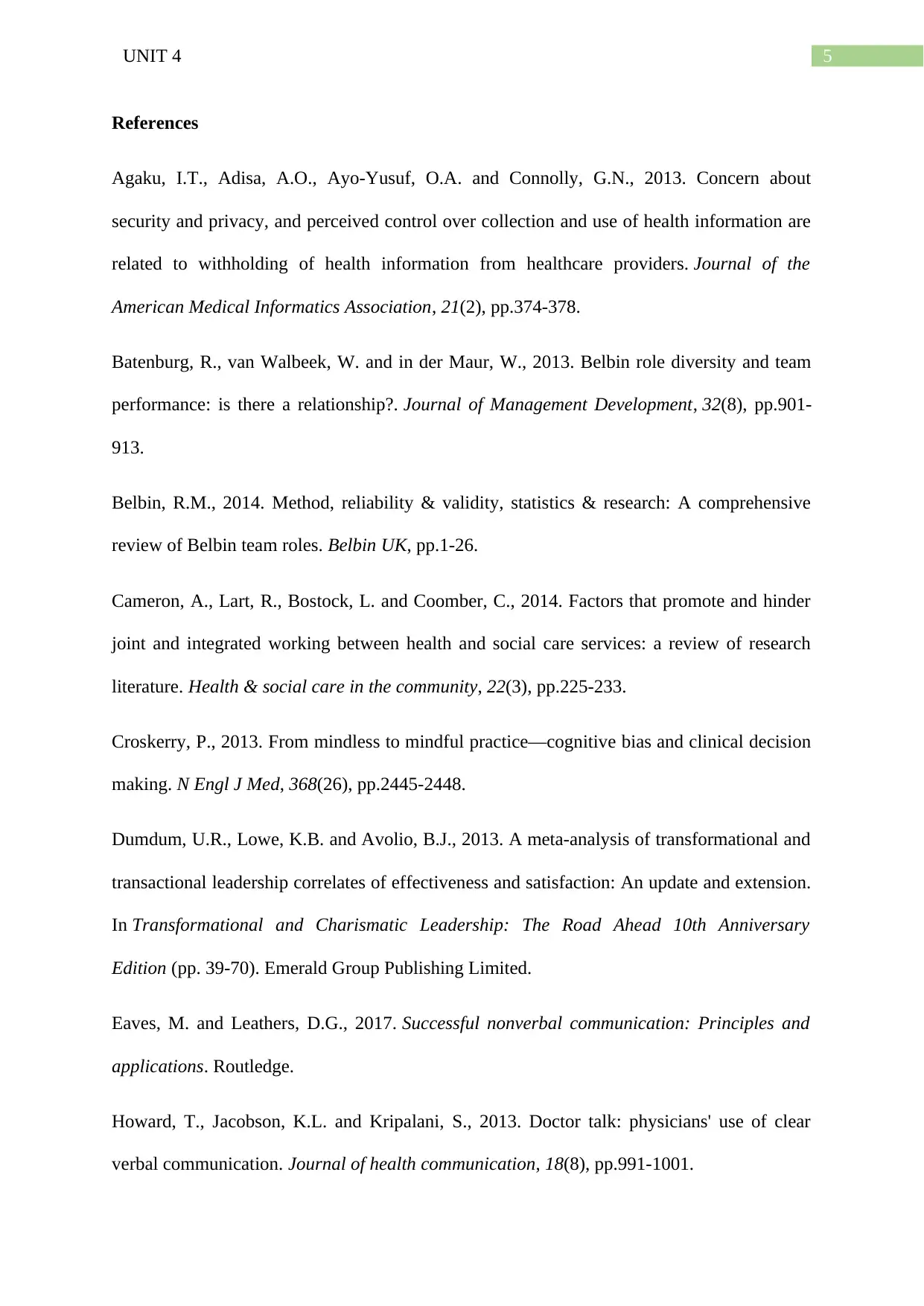
5UNIT 4
References
Agaku, I.T., Adisa, A.O., Ayo-Yusuf, O.A. and Connolly, G.N., 2013. Concern about
security and privacy, and perceived control over collection and use of health information are
related to withholding of health information from healthcare providers. Journal of the
American Medical Informatics Association, 21(2), pp.374-378.
Batenburg, R., van Walbeek, W. and in der Maur, W., 2013. Belbin role diversity and team
performance: is there a relationship?. Journal of Management Development, 32(8), pp.901-
913.
Belbin, R.M., 2014. Method, reliability & validity, statistics & research: A comprehensive
review of Belbin team roles. Belbin UK, pp.1-26.
Cameron, A., Lart, R., Bostock, L. and Coomber, C., 2014. Factors that promote and hinder
joint and integrated working between health and social care services: a review of research
literature. Health & social care in the community, 22(3), pp.225-233.
Croskerry, P., 2013. From mindless to mindful practice—cognitive bias and clinical decision
making. N Engl J Med, 368(26), pp.2445-2448.
Dumdum, U.R., Lowe, K.B. and Avolio, B.J., 2013. A meta-analysis of transformational and
transactional leadership correlates of effectiveness and satisfaction: An update and extension.
In Transformational and Charismatic Leadership: The Road Ahead 10th Anniversary
Edition (pp. 39-70). Emerald Group Publishing Limited.
Eaves, M. and Leathers, D.G., 2017. Successful nonverbal communication: Principles and
applications. Routledge.
Howard, T., Jacobson, K.L. and Kripalani, S., 2013. Doctor talk: physicians' use of clear
verbal communication. Journal of health communication, 18(8), pp.991-1001.
References
Agaku, I.T., Adisa, A.O., Ayo-Yusuf, O.A. and Connolly, G.N., 2013. Concern about
security and privacy, and perceived control over collection and use of health information are
related to withholding of health information from healthcare providers. Journal of the
American Medical Informatics Association, 21(2), pp.374-378.
Batenburg, R., van Walbeek, W. and in der Maur, W., 2013. Belbin role diversity and team
performance: is there a relationship?. Journal of Management Development, 32(8), pp.901-
913.
Belbin, R.M., 2014. Method, reliability & validity, statistics & research: A comprehensive
review of Belbin team roles. Belbin UK, pp.1-26.
Cameron, A., Lart, R., Bostock, L. and Coomber, C., 2014. Factors that promote and hinder
joint and integrated working between health and social care services: a review of research
literature. Health & social care in the community, 22(3), pp.225-233.
Croskerry, P., 2013. From mindless to mindful practice—cognitive bias and clinical decision
making. N Engl J Med, 368(26), pp.2445-2448.
Dumdum, U.R., Lowe, K.B. and Avolio, B.J., 2013. A meta-analysis of transformational and
transactional leadership correlates of effectiveness and satisfaction: An update and extension.
In Transformational and Charismatic Leadership: The Road Ahead 10th Anniversary
Edition (pp. 39-70). Emerald Group Publishing Limited.
Eaves, M. and Leathers, D.G., 2017. Successful nonverbal communication: Principles and
applications. Routledge.
Howard, T., Jacobson, K.L. and Kripalani, S., 2013. Doctor talk: physicians' use of clear
verbal communication. Journal of health communication, 18(8), pp.991-1001.
⊘ This is a preview!⊘
Do you want full access?
Subscribe today to unlock all pages.

Trusted by 1+ million students worldwide
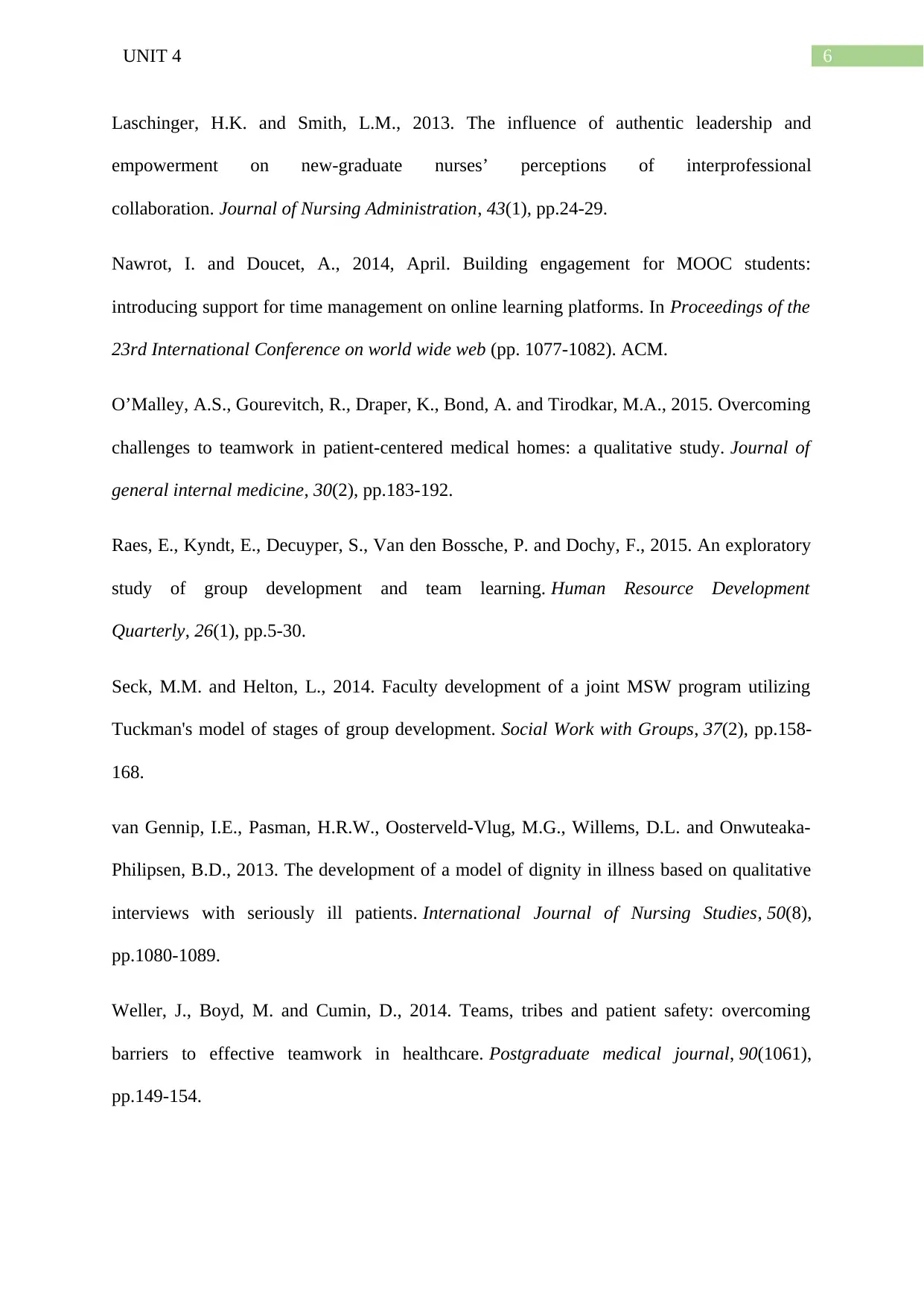
6UNIT 4
Laschinger, H.K. and Smith, L.M., 2013. The influence of authentic leadership and
empowerment on new-graduate nurses’ perceptions of interprofessional
collaboration. Journal of Nursing Administration, 43(1), pp.24-29.
Nawrot, I. and Doucet, A., 2014, April. Building engagement for MOOC students:
introducing support for time management on online learning platforms. In Proceedings of the
23rd International Conference on world wide web (pp. 1077-1082). ACM.
O’Malley, A.S., Gourevitch, R., Draper, K., Bond, A. and Tirodkar, M.A., 2015. Overcoming
challenges to teamwork in patient-centered medical homes: a qualitative study. Journal of
general internal medicine, 30(2), pp.183-192.
Raes, E., Kyndt, E., Decuyper, S., Van den Bossche, P. and Dochy, F., 2015. An exploratory
study of group development and team learning. Human Resource Development
Quarterly, 26(1), pp.5-30.
Seck, M.M. and Helton, L., 2014. Faculty development of a joint MSW program utilizing
Tuckman's model of stages of group development. Social Work with Groups, 37(2), pp.158-
168.
van Gennip, I.E., Pasman, H.R.W., Oosterveld-Vlug, M.G., Willems, D.L. and Onwuteaka-
Philipsen, B.D., 2013. The development of a model of dignity in illness based on qualitative
interviews with seriously ill patients. International Journal of Nursing Studies, 50(8),
pp.1080-1089.
Weller, J., Boyd, M. and Cumin, D., 2014. Teams, tribes and patient safety: overcoming
barriers to effective teamwork in healthcare. Postgraduate medical journal, 90(1061),
pp.149-154.
Laschinger, H.K. and Smith, L.M., 2013. The influence of authentic leadership and
empowerment on new-graduate nurses’ perceptions of interprofessional
collaboration. Journal of Nursing Administration, 43(1), pp.24-29.
Nawrot, I. and Doucet, A., 2014, April. Building engagement for MOOC students:
introducing support for time management on online learning platforms. In Proceedings of the
23rd International Conference on world wide web (pp. 1077-1082). ACM.
O’Malley, A.S., Gourevitch, R., Draper, K., Bond, A. and Tirodkar, M.A., 2015. Overcoming
challenges to teamwork in patient-centered medical homes: a qualitative study. Journal of
general internal medicine, 30(2), pp.183-192.
Raes, E., Kyndt, E., Decuyper, S., Van den Bossche, P. and Dochy, F., 2015. An exploratory
study of group development and team learning. Human Resource Development
Quarterly, 26(1), pp.5-30.
Seck, M.M. and Helton, L., 2014. Faculty development of a joint MSW program utilizing
Tuckman's model of stages of group development. Social Work with Groups, 37(2), pp.158-
168.
van Gennip, I.E., Pasman, H.R.W., Oosterveld-Vlug, M.G., Willems, D.L. and Onwuteaka-
Philipsen, B.D., 2013. The development of a model of dignity in illness based on qualitative
interviews with seriously ill patients. International Journal of Nursing Studies, 50(8),
pp.1080-1089.
Weller, J., Boyd, M. and Cumin, D., 2014. Teams, tribes and patient safety: overcoming
barriers to effective teamwork in healthcare. Postgraduate medical journal, 90(1061),
pp.149-154.
Paraphrase This Document
Need a fresh take? Get an instant paraphrase of this document with our AI Paraphraser
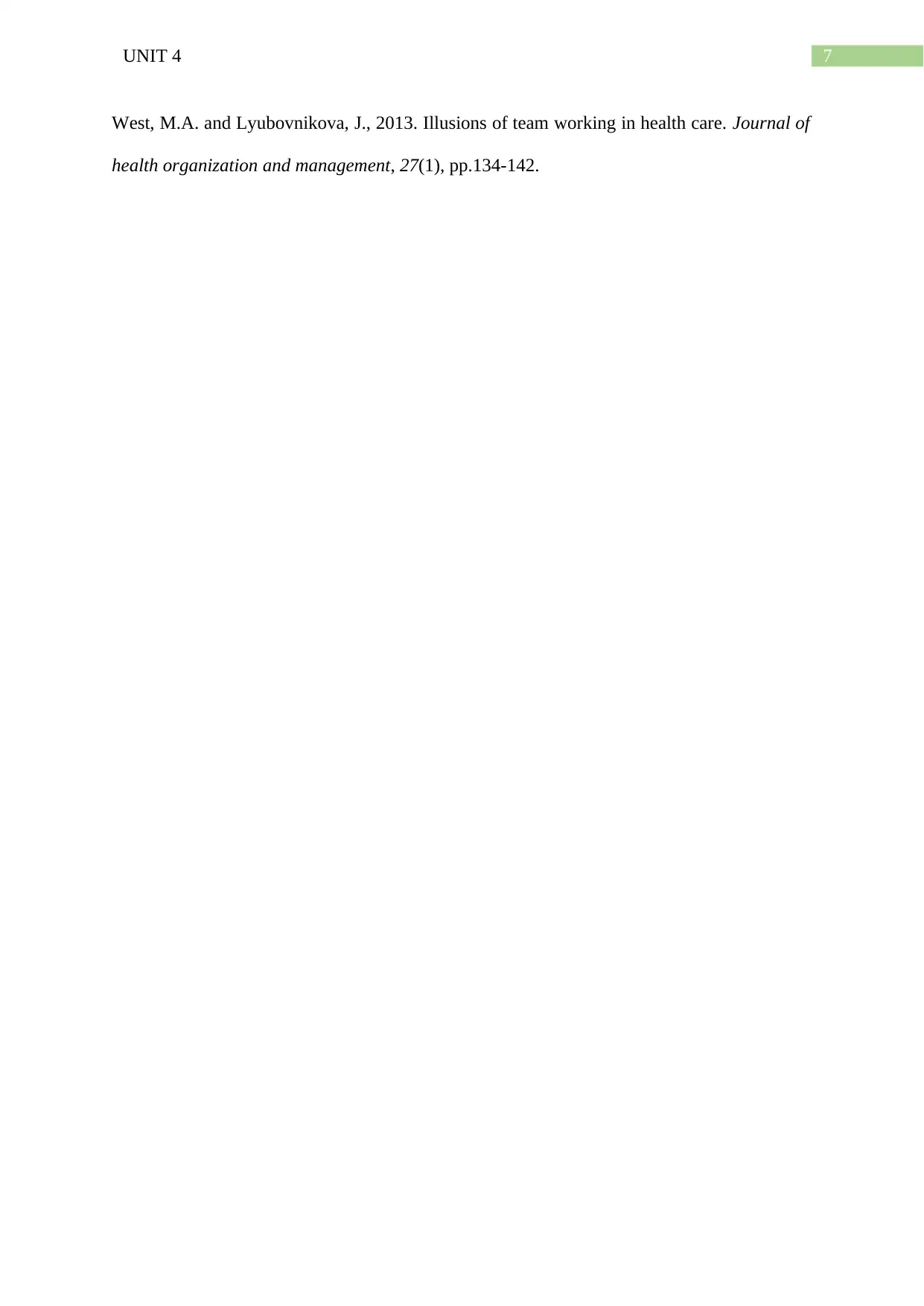
7UNIT 4
West, M.A. and Lyubovnikova, J., 2013. Illusions of team working in health care. Journal of
health organization and management, 27(1), pp.134-142.
West, M.A. and Lyubovnikova, J., 2013. Illusions of team working in health care. Journal of
health organization and management, 27(1), pp.134-142.
1 out of 8
Related Documents
Your All-in-One AI-Powered Toolkit for Academic Success.
+13062052269
info@desklib.com
Available 24*7 on WhatsApp / Email
![[object Object]](/_next/static/media/star-bottom.7253800d.svg)
Unlock your academic potential
Copyright © 2020–2026 A2Z Services. All Rights Reserved. Developed and managed by ZUCOL.





